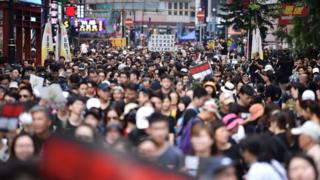 Image copyright
Image copyright
AFP
Organisers say they hope one million people will take part in the march
Thousands of people are marching on government buildings in Hong Kong over a controversial extradition bill, despite a government climb-down.
The bill, which would have allowed extradition to mainland China, prompted hundreds of thousands to demonstrate in the past week.
Hong Kong’s Chief Executive Carrie Lam said on Saturday that the plans had been “suspended” for the time being.
Protest leaders, however, are demanding it be permanently scrapped.
Some have urged Ms Lam to resign over the unrest.
By early Sunday afternoon, large crowds had gathered in the city’s Victoria Square, many wearing black or carrying white flowers.
Reports suggested the area was filled to capacity, with trains not stopping at overcrowded stations.
Some demonstrators paid tribute at the site of one protester’s death, where a man fell from scaffolding late on Saturday after erecting a banner calling for the bill to be scrapped.
What is the controversy about?
Protesters are concerned at increased influence by Beijing in Hong Kong, and the demonstrations over the bill have sparked some of the worst violence seen in years.
Hong Kong is a former British colony, but was returned to Chinese rule in 1997 under a “one country, two systems” deal that guarantees it a level of autonomy.
- All you need to know about the protests
- Hong Kong-China extradition plans explained
- Will the bill damage Hong Kong’s star status?
The government had argued the proposed extradition bill would “plug the loopholes” so that the city would not be a safe haven for criminals, following a murder case in Taiwan.
Critics have said the legislation would expose people in Hong Kong to China’s deeply flawed justice system and lead to further erosion of the city’s judicial independence.
On Saturday, after days of protests, Ms Lam said she had heard the calls for her government to “pause and think”.
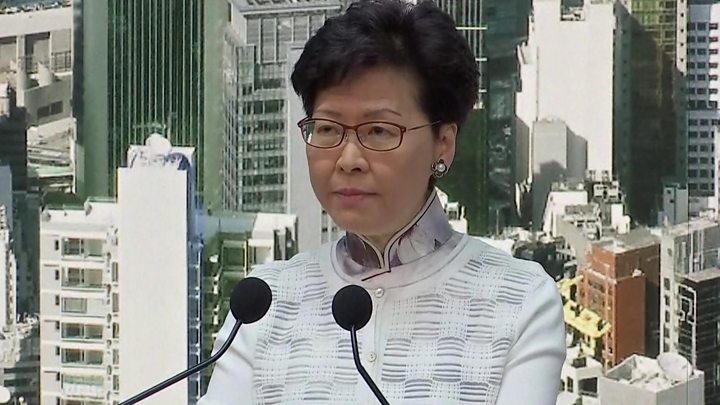
“I feel deep sorrow and regret that deficiencies in our work – and various other factors – have stirred up substantial controversies,” she added.
But she stopped short of saying the bill would be permanently shelved.
Jimmy Sham, from protest group the Civil Human Rights Front, said the announced suspension was like a “knife” that had been plunged into the city.
“It’s almost reached our heart. Now the government said they won’t push it, but they also refuse to pull it out,” he said.
China’s foreign ministry publicly backed Ms Lam after her announcement.
Why is there concern about China?
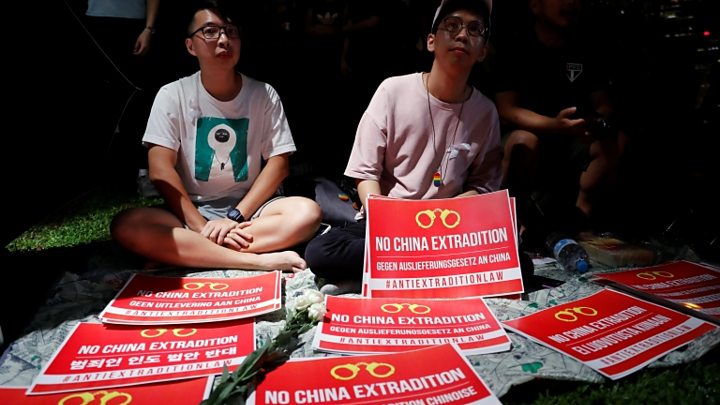
The changes would allow for criminal extradition requests from authorities in mainland China, Taiwan and Macau – decided on a case-by-case basis by Hong Kong courts.
But many fear the law could be used to target political opponents of the Chinese state.
Opposition activists also cite the alleged use of torture, arbitrary detentions and forced confessions in mainland China.
It comes after a high-profile case where a Hong Kong man was accused of murdering his girlfriend on holiday in Taiwan but could not be extradited.
Taiwanese officials are against the changes – due to their own concerns about the impact they could have.
Taiwan is in effect independent, but China considers it a breakaway province.
The government there has even said it would not accept the extradition of the accused man if it was under the proposed new rules.
How did protests unfold?
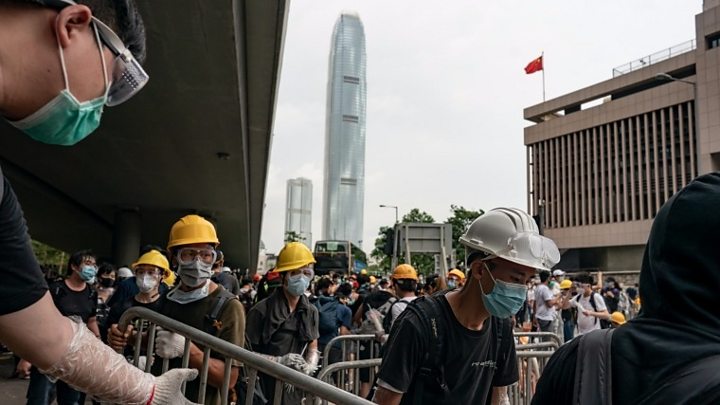
A large-scale march, which organisers said drew more than one million people, was held last Sunday.
Then on Wednesday tens of thousands gathered to blockade streets around government headquarters to try to stop the second reading, or debate, of the extradition bill.
Tensions boiled over and 22 police and 60 protesters were injured. Authorities say 11 people were arrested.
The police have been accused of excessive force by some rights groups.
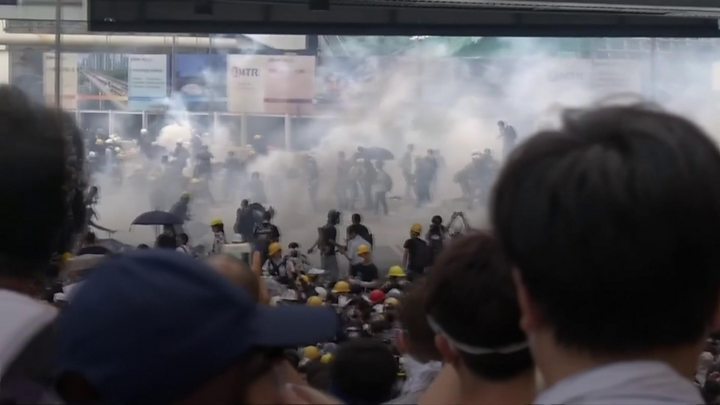
Until Saturday’s announcement, Ms Lam had not spoken publicly since she labelled the protests “organised riots” during a tearful address.
Is Hong Kong part of China?
Hong Kong was a British colony from 1841, when China ceded the island to the British after the First Opium War – which had erupted over British traders smuggling opium into China. It remained a colony until sovereignty was returned to China in 1997.
It is now part of China under a “one country, two systems” principle, which ensures that it keeps its own judicial independence, its own legislature and economic system.
- Beijing’s struggle to win Hong Kong’s young hearts
- The Hong Kong handover in a nutshell
- A timeline of Hong Kong’s history
It is what China calls a special administrative region – enjoying a great deal of autonomy that has made it a key business and media hub in the region.
But it remains subject to pressure from mainland China, and Beijing remains responsible for defence and foreign affairs.
Are you taking part in the protests today? If it is safe to do so please get in touch by emailing haveyoursay@bbc.co.uk.
You can also contact us in the following ways:
- WhatsApp: +44 7555 173285
- Tweet: @BBC_HaveYourSay
- Send pictures/video to yourpics@bbc.co.uk
- Upload your pictures/video here
- Text an SMS or MMS to 61124 (UK) or +44 7624 800 100 (international)
Hong Kong extradition bill: Large-scale march under way}

